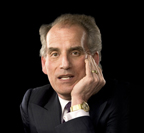ENV: Were you always subversive? Tell us about the childhood David Berlinski.

DB: I am not sure that I would care to think of myself as subversive. It is a mole-and-badger kind of word, isn’t it? So long as we are searching for similes, I would prefer lion-like. Regal is another fine word.
I was from an early age indisposed to accept what I had been told. Having been urged not to insert a fork into an electrical outlet, I stuck one in anyway; I was shocked to discover that it was a poor idea, just as my mother had maintained. An impatient child, I became a school yard terror, and a high-school bully. At the Bronx High School of Science I was a part of the clique — Moose Moscowitz, Steven Parker, Arthur Klein, June Tauber, Alan Abramson — that inflicted a life-long feeling of inadequacy on everyone else. I am often astonished that we got out of high school alive.
I have always been haunted by the meaning of my childhood. I was born in New York just a few months after my parents left Europe in flight from the Nazis. My parents having escaped Spain on virtually the last passenger ship to leave occupied Europe — the Marquis de Camellia — I assign to myself a most romantic Spanish conception. My father served in the French Foreign Legion and he had fought throughout the battle of France, his regiment decimated, 250 men left alive from the 2,500 men entering combat. Nonetheless, he had been thrilled, he told me late in his life, to be able at last to face the Germans with a weapon in his hands. It was, unfortunately, a 1916 water-cooled Hotchkiss machine gun, but, my father assured me ominously, it got the job done all the same.
My mother’s hatred of the Germans and Germany continues unabated into her one hundredth year.
There has been that constant reminder throughout my life of exile and expatriation, the loss of language. I live my life within the English language: Obviously so; but to this day, it is the sound of the German language that conveys die Heimat to me. Not das Vaterland, God forbid, but die Heimat.
In the early 1980s, a little French and German production company asked me to write a screenplay based on Kurt Götz’s fluffy little novel, Tatiana. They needed a screenwriter who could read the German original. So I had an advantage. The book was little known then and unknown today, but it prefigured Nabokov’s Lolita, and so remains a curiosity among literary scholars. Götz had achieved a success of sorts in Hollywood; he was known as a boulevardier, a man about town. He ended his days as a California chicken farmer. This, too, is a part of it, a writer talking to chickens, a weathered hand against the sun.
Ten years before they fled France, my parents had fled Germany; theirs was thus a double flight and a double expatriation. They had together grown up together in Leipzig, and they were both graduates of the Leipzig Conservatory. In France, they repeated their education at the Ecole Normale de la Musique, my father studying composition with Nadia Boulanger and piano with Alfred Cortot. The story of their escape from occupied France in late 1941 was the drama of my childhood: Hiding from the Gestapo in Marseilles, entry visas to the United States, exist visas from France, entry visas to Spain, exist visas from Spain; black market intrigues, Varian Frey, the flight across the Pyrenees, Spanish months spent waiting. It is odd now to think of Franco’s Spain as a refuge, but it was theirs and obviously it was mine.
Growing up under these circumstances and growing up, too, in a northern Manhattan, every last neighborhood ghost gabbling away in German, the greengrocer, Selig, a refugee from the Kaiser’s Germany, my greatest need in childhood was to escape the culture that my parents embodied. My greatest need thereafter was to reclaim it. These historical convulsions ramify downward through the generations. Both my children are expatriates.
My education was a straight shot: P.S. 84, the Bronx High School of Science, Columbia College, Princeton, my Ph.D., an accessory before the fact. What remains today of my institutional education is a three-part memory: An excellent year-long course in Euclidean geometry taught by Mrs. Mazen at the Bronx High School of Science; Norman Cantor’s course in medieval history at Columbia College; and Alonzo Church’s graduate course in mathematical logic at Princeton.
Thereafter, whatever I learned, I learned on my own.